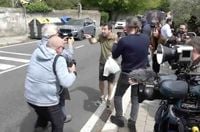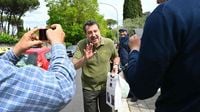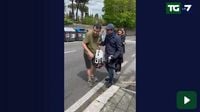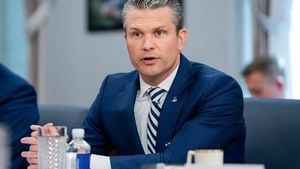On Saturday, April 19, 2025, Matteo Salvini, the Italian Deputy Prime Minister and leader of the League party, found himself in an unexpected spotlight while shopping near the Omani embassy in Rome. The embassy was the venue for critical discussions regarding Tehran's nuclear program between representatives of the United States and Iran, making Salvini's casual outing particularly notable.
Sporting a green Navy polo shirt and comfortable shorts, Salvini was carrying a shopping bag and a two-bottle pack of wine. His relaxed attire contrasted sharply with the serious diplomatic negotiations taking place just a stone's throw away. As he strolled along the sidewalk, he attempted to evade the attention of journalists who were eager to get a statement from him about the high-stakes talks.
"I’m here by chance, I just went out to do some shopping," Salvini told reporters, trying to downplay his proximity to the diplomatic event. Despite his efforts to deflect questions, the media were relentless, taking advantage of the rare opportunity to engage with a prominent political figure amidst significant international discussions.
As he maneuvered through the throng of journalists and police cordons, Salvini humorously remarked, "I’m not in interview attire, look at what I’m wearing," attempting to lighten the mood while clearly wishing to avoid the barrage of questions.
However, the gravity of the situation was not lost on him. When pressed about the importance of the ongoing negotiations, he shifted his tone, expressing hope for a positive outcome. "I sincerely hope that everything resolves well and that nuclear power is used only for peaceful purposes, such as providing energy to schools, hospitals, and homes, not to fuel conflicts or armaments," he stated earnestly.
Salvini's comments reflect a broader concern shared by many regarding the potential for nuclear energy to be misused. His emphasis on peaceful applications of nuclear technology resonates with ongoing debates about energy security and military applications of nuclear power, particularly in light of the delicate negotiations between the U.S. and Iran.
As he made his way back home, still clutching his shopping bags, Salvini managed to dodge further inquiries, swiftly exiting the scene. His casual shopping trip, juxtaposed against the backdrop of serious international diplomacy, served as a reminder of the complex interplay between everyday life and global issues.
The incident highlights the challenges faced by public figures who often find themselves thrust into the limelight unexpectedly. For Salvini, a leader known for his strong stances on immigration and national sovereignty, this moment was a unique intersection of personal and political spheres.
In a world where political leaders are frequently scrutinized for their actions and statements, Salvini's experience illustrates the unpredictability of public life. While he may have intended a simple shopping trip, the circumstances surrounding his outing transformed it into a noteworthy event, capturing the attention of both the media and the public.
As negotiations between the U.S. and Iran continue, the implications of their discussions extend far beyond the immediate diplomatic context. The outcomes of these talks could significantly impact global security and energy policies, making every comment from influential figures like Salvini all the more relevant.
In the end, Salvini's day of shopping was not just a mundane errand but a vivid example of how the personal and political can collide in unexpected ways. As he returned home, he carried not only his groceries but also the weight of public expectation and the pressing issues of international diplomacy.







